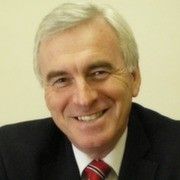Labour shadow chancellor John McDonnell to outline new economic plan to redistribute wealth

Labour's new shadow chancellor John McDonnell is set to unveil his new economic plan that promises to redistribute wealth and shift the tax burden away from lower income earners. His proposal will cover a review of the major economic institutions, a new remit for the Bank of England, a tough stance on corporate tax dodgers, as well as the introduction of a Robin Hood tax on stock market trading.
At a fringe meeting at the Labour conference in Brighton, the controversial politician said that his speech on Monday "won't be one of my normal rants" and "might by stultifyingly boring" because he would be setting out a series of economic initiatives.
He believes with a Financial Transaction Tax, it would rein in the excesses of the financial sector and help pay for the improvements needed at the National Health Service and other public services, according to the BBC.
In his first speech as shadow chancellor at the Labour party conference on 28 September, McDonnell will push for a Robin Hood tax on the stock market - effectively a tax levied on stock and foreign exchange trades.
David Hillman from the Robin Hood Tax campaign, which has garnered more than a million signatures for the petition, told the same meeting that there was nothing "dangerous or radical" about the tax, which he claims has the support from across the political spectrum in Europe. The tax will see "the banks and hedge funds pay for, or at least contribute to paying for, the immense economic damage their gambling - essentially it was gambling - had caused, he said.
McDonnell will also be demanding access to the financial models used by the Office for Budget Responsibility and the Bank of England to help Labour formulate an alternative economic policy and calculate the rate at which a Robin Hood tax could be set, says the BBC. "I think that should be open to all parties in Parliament" to test their own ideas "in advance of getting into government," he said.
McDonnell is also targeting tax collection by Her Majesty's Revenue and Customs in an effort to collect the billions of pounds lost in tax avoidance by UK companies and individuals every year. He is seeking to review every aspect of the taxman, including its operations, effectiveness and range of policies and instruments it has available to ensure "that we maximise our tax take and at the same time it's done on a fair and just basis."
During his campaign for the Labour leadership, Jeremy Corbyn had claimed that £120bn could be recovered from tax avoidance and evasion, which he said would be enough to pay off the UK's deficit without having to make welfare and public spending cuts.
Writing in the Daily Mirror, McDonnell said he wanted to launch a national debate about the future of the economy: "The way things have happened till now can't continue. And we as a country need to decide if we think it's right for the poverty and inequality that exist to continue - or will we find a new fairer path.
"As shadow chancellor, I make this solemn pledge, if elected in 2020, we will grow an economy which serves everybody, not just the rich few. And we will pay for it not on the backs of the poor and the most vulnerable but from a fairer taxation system which lifts the burden away from middle and low income earners and from collecting the tax lost every year to corporate tax dodgers," he said.
© Copyright IBTimes 2025. All rights reserved.






















